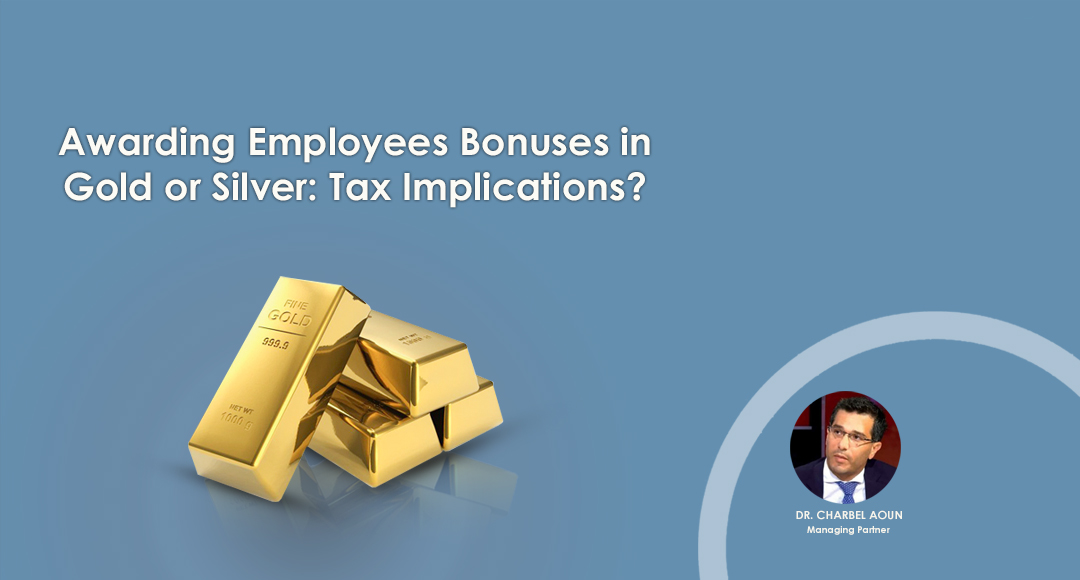Rewarding employees is a great way to boost morale and enhance motivation in the workplace. While many companies offer monetary bonuses, physical gifts can also be given to employees.
For employers seeking a more innovative approach to compensation or rewards, bonuses in the form of gold or silver may present an appealing option. This option has been adopted by a few companies in the UK and the United States in recent years.
For instance, in 2022, Cameron Parry, CEO of e-money provider TallyMoney in the UK, offered to pay his staff in gold rather than pounds as part of a new wage trial. It’s worth noting that participation in the gold trial scheme is not mandatory for workers, meaning they can continue to be paid in Sterling if they prefer.
However, a pertinent question arises: Is compensating employees with gold coins considered tax evasion, particularly in Lebanon?
In many jurisdictions, any form of compensation, including bonuses, is subject to taxation. In the United States more specifically in Nevada, Robert Kahre, Lori Kahre, and Alexander Loglia were found guilty of having conducted a payroll service where they paid employees in coins that were then immediately exchanged for cash. The defendants calculated the wages paid based upon the face value of the coin given to the employee, as opposed to its fair market value. For instance, for an employee who received 10 silver dollars, the defendants claimed he had received $10 in wages. But because each silver dollar had a market value of $50, the government contended that the wages should have been calculated as $500 (10 x $50).
In Lebanon, personal income tax is imposed on wages and salaries at progressive rates. According to the 2024 Budget Law, the progressive payroll tax rates range from 2% to 25%, applying to annual payroll tax brackets between LL 360 million and LL 13 500 million. Income tax is levied on various sources of income, including salaries, wages, bonuses, allowances, life annuities, pension payments, and other benefits in cash or kind provided by employers. However, certain categories of income, such as those received by certain diplomatic representatives and nursing staff, are exempt from income tax.
Additionally, transportation allowances, representation allowances, food and clothing allowances, and similar expenses incurred by employees in the normal course of business are not subject to taxation. Furthermore, amounts such as study grants, birth grants, marriage grants, and death grants given unanimously by the company to all its employees are exempt from taxation, provided they are granted following the same procedures as those of the Government Employees’ Cooperative.
Moreover, Article 38 of the 2022 Budget Law grants an exemption from payroll tax for the salaries of employees who have been permanently disabled as a result of the Beirut Port explosion.
The tax treatment of employee Gold option benefits is not explicitly addressed in Lebanon’s income tax law or its explanatory memos. Generally, gold is considered a salary-related benefit and is therefore subject to taxation in Lebanon. However, it is crucial for the Lebanese government to issue clear declarations or memos outlining the taxation status of providing salaries or bonuses in gold, including specifying the applicable rate of gold. Lebanon should prioritize issuing clear memos to employers, especially given the trend away from cash payments towards gold-based compensation. The absence of clear guidance not only leaves employers uncertain about their tax obligations but also creates opportunities for potential tax evasion practices.
Moreover, there is a lack of current court jurisprudence explaining the situation, particularly regarding whether paying salaries or bonuses in gold is subject to taxation. This legal ambiguity compounds the uncertainty faced by employers and emphasizes the urgent need for clear regulatory guidance from both legislative and judicial authorities. Without such clarity, businesses may inadvertently fall into non-compliance, ultimately undermining the fairness and effectiveness of the tax system.



